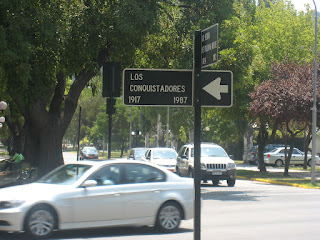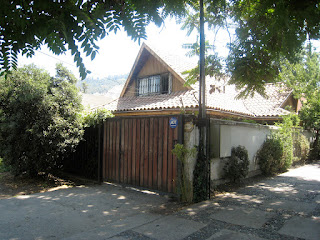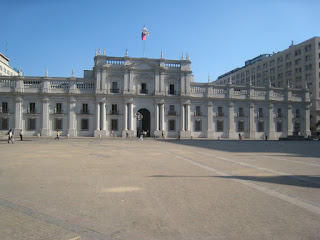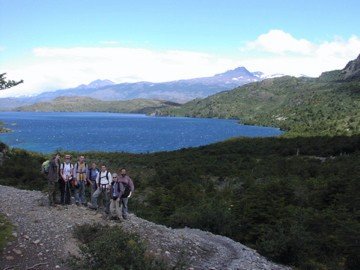How can worlds that are so different always seem to be so similar at the base of every thing. We are all human I guess.
How come there are some frases that always translate? and some there are no words for?
I have a bunch to say about my classes, but I will leave that to last in case literature isn't your thing. I understand, I still like you if it's not.
For the first time in my life, I feel like a real foreigner. In england, I never felt this way. Here I am different, alien, I stand out. my height, my coloring, my skin, my frame, my eye color- any one of these things individually wouldn't make a big deal here, but all together I feel like a walking neon sign. Yes, I realize that these are MY feelings and the way I am perceiving my existence here, and not necessarily how they perceive me. But sometimes (I overanalyze way too much) I feel as though in a single look I can feel the weight of a single person's feelings about the US. is this a little over the top or crazy? of course. I could be german, british, etc., etc., really even Chilean. Twice now, people have asked Berti if I'm her daughter. she always says yes. I guess it's easier than explaining. There is nothing particularly prominent about me that screams "I'm AMERICAN" or is there? I guess I'm not sure.
Rodrigo, my grammar professor, was telling me today that Americans have a very distinct spanish accent, but he said that mine wasn't that bad. Yeah! I guess?
So, I'm not sure what else to say about being a foreigner. It's not like I'm one of those people that likes to blend in necessarily, but . . . I don't know-it's an interesting feeling, how do we size up people on the streets in the US when we think they're not from "around here" there clothes, their skin, their voices. what do we imagine?
what grand mass of images do I represent to the people here. All I have to say is, thank god my hair isn't blonde.
So, I usually get on the subway with my earphones in my ears, grab the nearest pole, and try to people watch without staring. I literally TOWER over the women. ok, maybe I'm exaggerating, but that's how I feel. and the metro doors, they are that type of tinted glass, I don't know, almost like a television screen, that projects a fuzzy almost curved reflection of its characters when the metro pulses through dark tunnels. and when I see my reflection, I don't know, sometimes I am surprised.
So, I get off the metro, turn right and walk down about fifty feet, and turn left to walk up the stairs. At the top of the stairs I take another left, walk about 15 ft, and then go right through these little swinging mini doors (you know the kind in subways) and take another left to walk down a long stuffy hallway. On the left all along this hallway are little shops: a hosiery shop, a snack store, a small cheap gift store, etc. then when the hallway dead ends I take a right up the stairway into the sun onto the street. I walk about three blocks, dodging people, and quickening and slowing my pace to sinc with the flow of the crowd, and then when I see the Lan Chile sign in front of me I turn left.
 and I this is the street I walk down . . . all the way until
and I this is the street I walk down . . . all the way until I reach this stop light. I wait to cross, cross, and then
I reach this stop light. I wait to cross, cross, and then begin to walk over the bridge. This is the view midway on the bridge, looking left.
begin to walk over the bridge. This is the view midway on the bridge, looking left. as soon as I cross the bridge, I see this tree on my left. My favorite tree. I seriously have a relationship with this tree.
as soon as I cross the bridge, I see this tree on my left. My favorite tree. I seriously have a relationship with this tree. This is the view of my next stop, right past the tree.
This is the view of my next stop, right past the tree.  This is the view down the next two blocks, and no--that man is not always in front of me--
This is the view down the next two blocks, and no--that man is not always in front of me--
 This is my street sign: Los Conquistadores. I turn left here.
This is my street sign: Los Conquistadores. I turn left here. and this is my street! I walk half a block and then
and this is my street! I walk half a block and then My house is on the right. cool huh?
My house is on the right. cool huh?Yesterday after lunch, all on my own, I went to find La Moneda (it's like the Chilean white house), and I was a little disoriented and got a bit lost for about ten minutes but I since I was alone I didn't want to take out a map or basically paste a sign on my forehead which said "Hi. I'm alone and not from here. Pickpockets or just generally theives of all kinds welcome," so I tried to play it cool and acted like I, of course, knew exactly where I was going. Then, I walked over to a park like area in between the roads and sat in the grass under the trees. Then, I took out my map, figured out where I was and went and found La Moneda.
Once I got there, I was a littled overwhelmed and flooded with my own personal images of the coup (when Pinochet took power in 1973 and violently stormed La Moneda). Again not wanting to look to much like a tourist, I only took one picture:

When I got home Berti told me that there is actually a museum down inside. So, I need to go back and go through the museum. Claudia also told me last night that up in one of the top right windows you can see bullet holes in the glass from the snipers.
"May you go forward in the knowledge that, sooner rather than later, the
great avenues will open once again, along which free citizens will march
in order to build a better society. Long live Chile! Long live the
people! Long live the workers! These are my last words..."
--Salvador Allende, in his final radio address from La Moneda
__________________________________________________________________________________________________________________
In other news,
last night a friend of Gianni's came over, Kayse, he's really nice and Claudia, Kayse, Gianni, Berti and I sat around the table and talked for a few hours. I Almost understood everything that was said. good times.
Then Claudia and I watched two more episodes of Grey's Anatomy. Seriously, 1) if you're not a Grey's lover-you should be. 2)you got appreciate how grey's messages transcend cultures and languages-I mean we are seriously bonding over Grey's, and I've been downloading the new episoded on itunes, but watching the old ones is like reliving an old precious memory, ok I'm being dramatic, but if you're a true Grey's fan, you understand.
I digress.
WARNING: If you don't like to talk or think about books, their deep and life changing meanings, and all that jazz, skip down to the poems.
I have fallen in love. . .
with my literature class. my profesora, Macarena, is working on her Doctorate in linguistics but she loves literature and has studied latin american literature, so we are read four stories this week, two from one author and two from another. and it's so funny because I almost feel like the literature gods are punching me in the back and saying, "see? this is what ignites you."
First we read two stories “El páramo” y “El témpano de Kanasaka” (tempano means iceberg) from Francisco Coloane, a Chilean writer whose stories focus on a lot on the arrea of Chile which is called the Tierra del Fuego, the very southern area of the country, that isn't as "civilized."
Next, we read two stories "La compuerta # 12" y “Quilapán” by another Chilean author names Baldomero Lillo. And I won't go into too much detail about our analysis of these. But it amazes me how similar the literary themes are between what we have read so far and the themes I have talked about in many an american or british lit class.
-the big ideas:
(Coloane) how man relates to nature. In most of Colane's stories nature always control, is the immense and powerful personified character, that punishes man when he tries to hurt nature.
(Lillo) man's reflection about his existence-being trapped in his place in the world, the cyclical nature of life, how the burdens of survival are passed down from generation to generation
-and of course the biggest of all, the struggle between "civilization" and "nature" or the "barbaric"
what does it really mean to be "civilized"
We've had many discussions about indigenous peoples because Lillo's second story is basically the story of a rich white landowner who comes in and takes an indiginous chilean man's land by force, and eventually leading to this man's death.
The points:
-This indiginous man doesn't speak the white man's language.
-The indiginous man doesn't believe in the concepts of "buying" or "selling" land
-because he is at once and always at one with the land, a part of it, and can not conceptualize being its owner
-he fights with his family to protect his land against the white man, but
-his house his destroyed, his family terrorized, he is tortured, and left to die,
-only when he is about to die does he return to the land to die in a hole and reunite with his earth
ok people. sound familiar?
it's fascinating.
Coloane's work projects the image that nature's immensity and profundity are at all times bigger than we can imagine and ultimately in control. all that was before us, humanity, will be here after, even if we are not aware of it-and when we lose respect of that immensity, nature, we will be punished.
Lillo, on the other hand, seems to project the idea that ultimately we are helpless in any fight against "civilized" man's domination. "Civilization" can and will take over every inch of the world eventually. and this "civilization" in reality, is much more "barbaric" than we could ever imagine, much more so then the "uncivilized savagery" that civilization so easily writes off and destroys.
hmm, hello english major.
For the past two days Macarena and I have rode the metro home everyday and so we've talked about so many things like the civil rights movement, native americans in the united states and the mapuches in Chile, race and race relations, elections and the political process in both countries.
Chile. . . I am engaged with your stories.
Rodrigo, my grammar professor, is helping me a lot. Thanks to Domcekova's advanced spanish grammar, I already know all the forms. So, we're just reviewing, and I'm doing much better than I thought I would. I think it's because I'm actually using all these forms on a daily basis. I feel really excited about how quickly we are going. Today we spent about half of the day doing grammar stuff and the other time in conversation. He asked me about what movies I'd seen lately-so I told him about Blood Diamonds and Stranger than Fiction (haven't seen them? you should-if you love textual analysis, stranger than fiction is a gem). I think the dvd is coming out in feb., and I want it.
anyways, we also talked about latin american authors, Eduardo Galeano (de Uruguay), who I love, and Robert Boleano (Chileno). I've read one of his books, but he recommened his last collection, 2666. We had a nice convo.
I'm writing this at about 8:28 pm, and it's my favorite time of the day because things are beginning to cool off, the light beginning to only lightly blanket the city, and there's a lovely breeze. Here's the view from the left of my window as I write this:

Alright, I've got a essay due on Monday and a bunch of grammar homework, so I'm out.
Hope you and yours are happy and safe.
"I met each one of its sons
and in me the seasons succeeded one another,
weeping or flowering."
una aurora,
mere
Spanish and English below:
"Insomnio"
En medio de la noche me pregunto,
qué pasará con Chile?
Qué sera de mi pobre patria oscura?
De tanto amar esta nave delgada,
estas piedras, estos terrones,
la persistente rosa
del litoral que vive con la espuma,
llegué a ser uno solo con mi tierra,
conocí a cada uno de sus hijos
y en mí las estaciones caminaban
sucesivas, llorando o florecienco.
Siento que ahora, apenas
cruzado el año muerto de las dudas,
cuando el error que nos desangró a todos
se fue y empezamos a sumar de Nuevo
lo major, lo más justo de la vida,
aparece de nuevo la amenaza
y en el muro el rancor enarbolado.
Here’s the English. I didn’t really like the way the English version in my book changed the line breaks and the punctuation so this is my translation.
Insomnia
In the middle of the night I ask myself,
what will happen to Chile?
What will become of my poor dark country?
From loving this thin ship so much,
these stones, these little farms,
the persistent rose
of the coast that lives among the foam,
I became one with my country.
I met each one of its sons
and in me the seasons succeeded one another,
weeping or flowering.
I feel that now,
with the dead year of doubt scarcely over,
when the mistake that bled us all
is over and we begin to plan again
a better and more just life,
the menace once again appears
and on the wall a rising rancor.





No comments:
Post a Comment